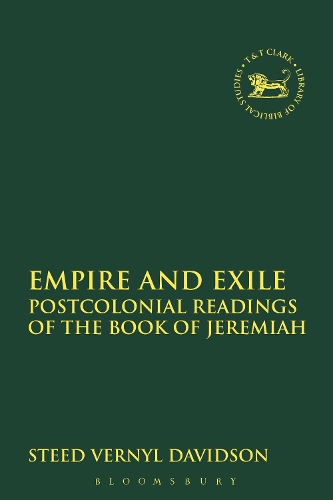
Empire and Exile: Postcolonial Readings of the Book of Jeremiah
(Paperback)
Available Formats
Publishing Details
Empire and Exile: Postcolonial Readings of the Book of Jeremiah
By (Author) Dr. Steed Vernyl Davidson
Bloomsbury Publishing PLC
T.& T.Clark Ltd
23rd May 2013
United Kingdom
Classifications
General
Non Fiction
Criticism and exegesis of sacred texts
224.206
Physical Properties
Paperback
240
Width 154mm, Height 232mm, Spine 14mm
360g
Description
Empire and Exile explores the impact of Babylonian aggression upon the book of Jeremiah by calling attention to the presence of the empire and showing how the book of Jeremiah can be read as resistant responses to the inevitability of imperial power and the experience of exile. With the insight of postcolonial theory, resistance is framed in these readings as finding a place in the world even though not controlling territory and therefore surviving social death. It argues that even though exile is not prevented, exile is experienced in the constituting of a unique place in the world rather than in the assimilation of the nation. The insights of postcolonial theory direct this reading of the book of Jeremiah from the perspective of the displaced. Theorists Homi Bhabha, Partha Chatterjee, Stuart Hall, and bell hooks provide lenses to read issues peculiar to groups affected by dominant powers such as empires. The use of these theories helps highlight issues such as marginality, hybridity, national identity as formative tools in resistance to empire and survival in exile.
Reviews
Empire and Exile offers a lucid analysis of ways in which the book of Jeremiah reveals ancient Judean strategies for cultural survival during the period of Babylonian domination. Deftly deploying insights of Frantz Fanon, Homi Bhabha, Stuart Hall, and other postcolonial theorists, Davidson reads Jeremiah's sign acts, discourses, and biographical narratives as complex responses to the pressures of colonization and dislocation. Fresh and compelling, this work sheds new light on the ambivalences that attend the subaltern's struggle to reconfigure "home" in an imperial context. Empire and Exile is an indispensable resource for readers wishing to explore the intersections of postcolonial criticism and biblical studies. -- Carolyn J. Sharp, Yale Divinity School, USA
Davidson has written a compelling work that manages to balance traditionalhistorical-critical approaches to Jeremiah with newer methodologies. In fact, he is able to demonstrate that newer reading strategies, such as postcolonial approaches, may help clarify traditionally difficult issues in Jeremiah studies. -- Phillip Michael Sherman, Maryville College * Religious Studies Review *
Author Bio
Steed Davidson received his Ph.D. from Union Theological Seminary, New York. He is an Assistant Professor of Old Testament at Pacific Lutheran Theological Seminary, Berkeley California. His teaching centers on prophetic books, paying attention to ancient empires and responses to empires in the formation of texts.
